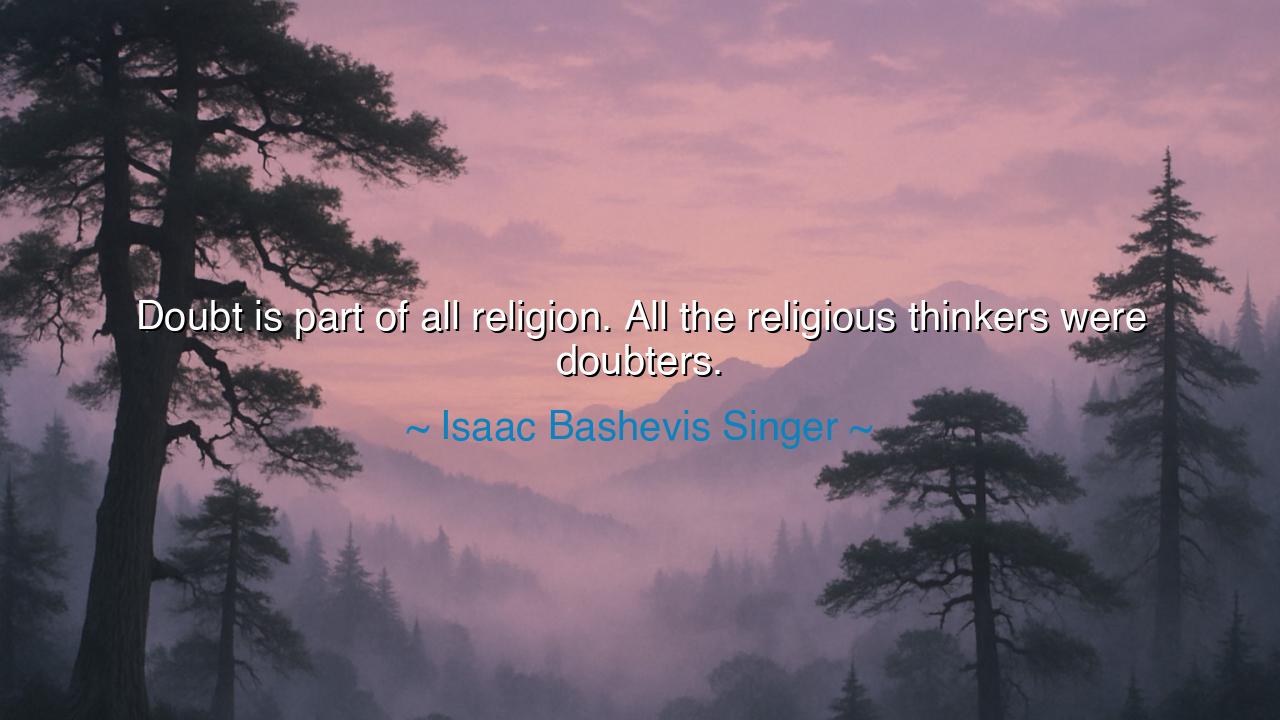
Doubt is part of all religion. All the religious thinkers were






“Doubt is part of all religion. All the religious thinkers were doubters.” Thus spoke Isaac Bashevis Singer, the teller of human souls, whose stories bridged the sacred and the absurd, the holy and the flawed. In these few, powerful words, Singer reveals one of the deepest paradoxes of faith — that doubt is not the enemy of belief, but its companion. For faith without questioning is not faith, but obedience; and only through wrestling with uncertainty can the soul truly know the presence of the Divine.
Singer was born in a world where religion was not merely an idea but the air people breathed — the Jewish villages of Poland, where rabbis debated God’s justice as freely as others discussed the weather. Yet even amid deep devotion, he saw struggle: men who prayed and still despaired, women who lit candles and still wondered if heaven heard them. From this tension between belief and uncertainty, Singer’s wisdom was born. To him, the greatest saints and thinkers were not those who never doubted, but those who carried their doubt as a sacred burden — a fire that purified, not destroyed.
To say that “doubt is part of all religion” is to acknowledge that faith is not a tranquil sea but a vast, shifting ocean. The prophets, the sages, the mystics — all walked through storms of confusion and fear. Abraham doubted when commanded to sacrifice his son; Moses doubted when the desert stretched endless and dry; Job doubted when the heavens turned silent to his suffering. Even Jesus, in the moment of crucifixion, cried, “My God, my God, why hast Thou forsaken me?” In every faith, from the Vedic seers to the Buddhist bodhisattvas, doubt appears not as failure, but as the forge of revelation.
For doubt is the mirror that tests the soul’s reflection. Without it, faith would be blind; with it, faith becomes alive. The one who doubts does not turn from God — he seeks Him more earnestly. Singer reminds us that the religious thinkers were doubters because they dared to ask the hardest questions. They refused the comfort of easy answers. Their doubt was not rebellion, but longing — the restless search for truth that makes faith authentic. As iron sharpens iron, so does doubt refine belief.
Consider the life of Mother Teresa, revered as a saint, yet in her private letters confessed to long years of spiritual darkness. “Where is my faith?” she wrote. “Even deep down… there is nothing but emptiness.” And yet she continued her mission, feeding the poor, comforting the dying, serving the forsaken. Her doubt did not destroy her faith; it made it radiant, real. In her silence, she discovered what Singer meant — that true religion is not certainty, but perseverance in mystery.
Singer’s words also carry a quiet defiance against fanaticism. He warns us that when people claim absolute certainty in matters of faith, they no longer serve God, but their own pride. The one who never doubts becomes cruel, for he has forgotten humility. The doubter, however, remains humble, knowing that the Infinite cannot be caged by human understanding. To doubt, therefore, is to honor the vastness of the divine — to admit that the light of truth is too great for any one mind to contain.
So, O seekers of wisdom, learn this lesson well: embrace your doubt. Do not hide it, nor despise it, for it is the seed from which deeper faith may grow. When you question, question sincerely; when you struggle, struggle honestly. Let your doubt lead you not away from the sacred, but into it — for it is often through the cracks of uncertainty that grace enters the soul.
For in the end, as Singer teaches, doubt is not the darkness that opposes faith — it is the shadow cast by its light. Those who doubt are not lost; they are journeying. And when the journey feels endless, remember this: even the holiest have walked through night to reach the dawn. Therefore, do not seek to destroy your doubt. Let it teach you to listen, to wonder, to love — for in doing so, you will discover that doubt and faith, like night and day, are not enemies, but eternal companions guiding the soul toward the truth.






AAdministratorAdministrator
Welcome, honored guests. Please leave a comment, we will respond soon